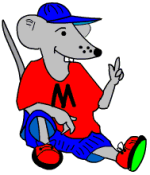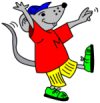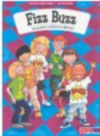maths tables and square number
 By year 6 children should have a very good working knowledge of all tables facts up to 10×10. In fact, the Primary Framework suggests that children should know their tables at a much earlier age. However, there is no harm in a little revision!They should also be able to react quickly to questions such as “How many eights make 56?”
By year 6 children should have a very good working knowledge of all tables facts up to 10×10. In fact, the Primary Framework suggests that children should know their tables at a much earlier age. However, there is no harm in a little revision!They should also be able to react quickly to questions such as “How many eights make 56?”
The first page is a revision sheet. Use it to find which tables are proving to be more difficult – usually it is the 6, 7 and 8s which pose the problems.
Square numbers come up on the second sheet. Once again children are expected to know square numbers at least up to 10×10 – after all they are only a part of their tables. Once they know that 6 x 6 is 36, if they have a good knowledge of place value they will be able to work out that 60 x 60 is 3600.
6301-01 Tables square challenge
6301-02 More tables questions
 The metric system is so easy to understand. Take length for example: no 12 inches in a foot, 3 feet in a yard or 1760 yards in a mile. It’s all tens, hundreds and thousands! By Stage 4 (8/9 yrs old) children should know the standard units of measurement for length, including the abbreviations.
The metric system is so easy to understand. Take length for example: no 12 inches in a foot, 3 feet in a yard or 1760 yards in a mile. It’s all tens, hundreds and thousands! By Stage 4 (8/9 yrs old) children should know the standard units of measurement for length, including the abbreviations.

 By year 6 children should have a very good working knowledge of all tables facts up to 10×10. In fact, the Primary Framework suggests that children should know their tables at a much earlier age. However, there is no harm in a little revision!They should also be able to react quickly to questions such as “How many eights make 56?”
By year 6 children should have a very good working knowledge of all tables facts up to 10×10. In fact, the Primary Framework suggests that children should know their tables at a much earlier age. However, there is no harm in a little revision!They should also be able to react quickly to questions such as “How many eights make 56?”